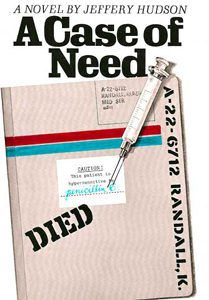It’s tempting to say “The Andromeda Strain” (1969) is Michael Crichton’s first great novel. Certainly, it’s the first techno-thriller, and the mimicked reportage style influenced all his later classics where he did actual research. However, a case could be made that “A Case of Need” (1968) is his first great one.
Rare med thriller from Crichton
It’s a medical thriller, written under single-use pseudonym Jeffery Hudson. Not as groundbreaking in style as “The Andromeda Strain,” it’s still better than most of his John Lange pulp novels, where we can tell he’s still learning the craft. “A Case of Need” is easily readable for a layperson as Crichton blends hardboiled writing principles with what he learned in med school.
Main character Dr. John Berry (a stand-in for the author) doesn’t intend to play detective, but he can’t help himself: His friend Dr. Lee has been wrongly arrested for performing an abortion that led to the patient’s death. Simply put, Berry is too good a friend to let Lee’s plight run its legal course, like everyone else in the Boston medical community.

“A Case of Need” (1968)
Author: Michael Crichton, writing as Jeffery Hudson
Genre: Medical mystery
Setting: Boston, 1968
Readers might be surprised that “A Case of Need” isn’t lecture-y about abortion, which was illegal when Crichton published the book (at age 26!), nor is abortion the only hook. I was more drawn in by the mystery of who the deceased young woman is, who performed the abortion, and why it went wrong.
Interestingly, Lee is a minor character after Berry and we are satisfied that he couldn’t have performed the abortion. But I actually like that we don’t get mired in Lee’s horrible experience of sitting in a jail cell, abused by Boston cops who hate abortionists on religious grounds.
“A Case of Need” also presents doctors’ environments as something where, true, the layperson won’t understand all the details. But Crichton brings us closer to understanding. As would become his core trait, he pauses from the narrative for a paragraph about the background of a medical topic.
Abortion is main theme
While the novel is not only about abortion, that is the major theme. So in the appendix, Crichton outlines six arguments for and against the procedure being legal. As we’d see whenever he tackles an issue in his SF novels, he presents an issue from all sides. He takes a side, but the reader is welcome to disagree.
The personal bias I bring to a novel about abortion is that I’ve found illegality adds a layer of danger to any human interaction. It’s almost always better for two parties to work something out than for a third party to intervene with a strict rule. So the lesser evil is almost always that something should be legal.
An exception is interactions that result in a direct victim. Do fetuses count as victims? Children are appropriately subject to their parents, and the degree of that status is greater the younger the child is. Therefore I believe the mother can choose to abort a fetus early in a pregnancy, but legal intervention is warranted if a parent kills a child after he or she is born.

Later-term abortions are the gray area in between, but this situation is relatively rare and usually includes additional factors (health risks to the mother or quality-of-life issues for the child) that add context.
The perils of illegality
In the end, I am morally pro-life, but pro-choice in legal terms — which is how the phrase is always used.
At a couple points, Crichton illustrates the opposite POV: people who are pro-life in legal terms despite being morally pro-choice. As he notes in the appendix, some doctors in 1968 oppose abortion because it’s illegal. One character in the story rejects arguments for the medical benefits of marijuana based on the fact that it’s illegal.
Although abortion became legal in 1973, “A Case of Need” remains relevant for its portrayal of how illegality makes everything worse (as still applies to marijuana today). Abortion arguments have continued since its legalization, but most are emotional rather than logical.
The abortion rate is now lower than when it was illegal, and of course, the practice is safer than when it was illegal. So while it seems counterintuitive, it’s logical to support legal abortion on the grounds of saving lives of both mothers and the unborn.
Why no more med mysteries?
Reading this medical mystery that flows so naturally from the author, I wondered why Crichton didn’t write more than one. (Granted, “Andromeda” and “The Terminal Man” had aspects of medical drama before Crichton fully embraced his techno-thriller-writer rep.)
I thought maybe the screen became his outlet for straight med mysteries. But not really: He made the medical thriller “Coma” (1978) and launched “ER” (1994-2009). “ER” was his ready-made outlet for telling these stories. But he only wrote the first episode.
I think the answer is that Crichton went to medical school to have a stable career more so than because he loved medicine. When he fairly quickly became that rare case – a writer for whom writing is a stable and lucrative career – he chose writing.
Medicine, it turns out, was one of many topics that Crichton latched onto through his years as a voracious researcher. It’s actually his “research” (med school) that makes “A Case of Need” so good.
He essentially got this genre out of his system; the appendix includes his thoughts on several medical issues of the day. At first blush, it’s a shame that he didn’t write more medical thrillers. But not if they would’ve displaced his novels on a wealth of additional topics.

